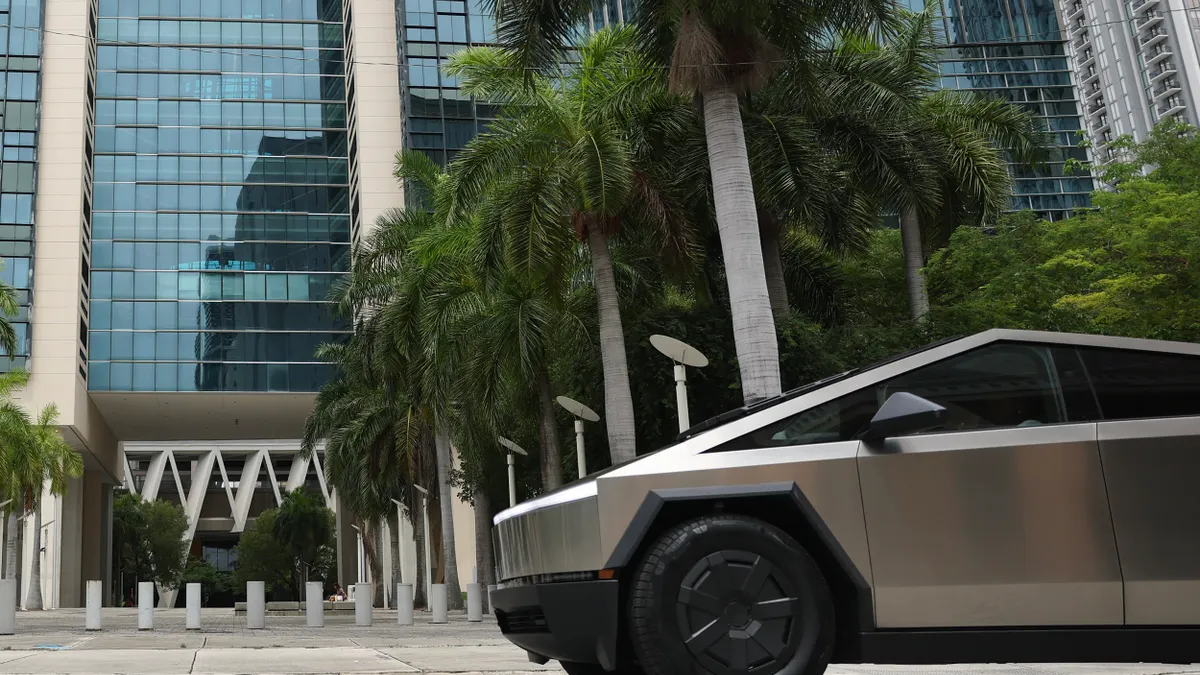Dive Brief:
- Provisions of the tax and spending plan included in the Big Beautiful Bill relating to the electric vehicle market have left Tesla in a “weird transition period,” with the automaker poised to lose certain incentives in the U.S. market, CEO Elon Musk said Wednesday during the company’s earnings call.
- “I mean, does that mean like we could have a few rough quarters? Yes, we probably could have a few rough quarters,” Musk said relating to the impact of such shifts in response to questions.
- The Austin, Texas-based company faces several “near-term challenges” related to the negative impacts of the Trump administration’s spending plan as well as tariffs, CFO Vaibhav Taneja said Wednesday according to a transcript. For its Q2 of 2025, the EV maker saw a slump in both revenue and profit for the second consecutive quarter.
Dive Insight:
Among other regulatory shifts likely to affect the business, the tax bill ends a $7,500 EV tax credit in September, as well as reducing the amount of penalty for certain emission standards to zero — which will affect new sales of regulatory credits and in turn contribute to lower revenue, Taneja said during the call. Because of the “abrupt change,” Tesla has a limited supply of vehicles in the U.S. for this quarter, he said.
“If you are in the U.S. and looking to buy a car, place your order now as we may not be able to guarantee delivery orders placed in the later part of August and beyond,” Taneja said. The CFO also warned of a continuing negative impact related to tariffs, noting sequentially, the cost of tariffs “increased around $300 million with approximately two-thirds of that impact in automotive and [the] rest in energy,” he said. “However, given the latency in manufacturing and sales, the full impact will come through in the following quarters, and so costs will increase in the near term.”
For its second quarter ended June 30, the EV maker saw a dip in both revenue and profit, with total revenue declining 12% year-over-year to $22.5 billion, according to its earnings presentation. Operating income, meanwhile, slumped by 42% YoY to $0.9 billion, while net income attributable to shareholders dropped by 16% to approximately $1.1 billion. Tesla attributed the slide partly to lower vehicle deliveries and sales, after it reported a 14% decline in deliveries on July 2.
Despite poor sales, however, Musk noted he was still optimistic about the company’s future and championed certain new initiatives during the Wednesday call, including its “robotaxi” pilot in Austin, where the EV maker is testing out autonomous vehicles.
The quarterly results come as Tesla continues to face increased attention from both consumers, investors and regulators. The EV maker is facing two separate suits surrounding its self-driving technology, including a jury trial unfolding in Florida surrounding a 2019 crash. Tesla is also clashing with the California Department of Motor Vehicles surrounding claims that it misled consumers about the capabilities of its self-driving technology, Bloomberg reported.
Tesla also continues to field backlash against CEO Musk’s political activities, with shares of the EV maker falling in July after Musk announced he would be forming an independent political party, the New York Times reported.
The company’s executive leadership fell under further scrutiny after two separate filings with the Federal Election Commission also listed Taneja as the treasurer for “America Party (AEMP)” and “The America Party (TAP),” respectively, CFO Dive previously reported. The FEC has sent letters addressed to the parties noting certain details may be incorrect — the filings each give an erroneous California address for the party and list a phone number which leads to Tesla’s investor relations team — and asking for further information by Aug. 11.
Tesla shareholders have also upped the pressure on Musk as the company continues to see weak sales, with a group of 27 shareholders sending a letter to company leadership listing growing concerns surrounding its corporate governance before the company designated the date of its annual shareholder meeting, CFO Dive previously reported.
As Tesla continues to make further investments into new technologies, including artificial intelligence, robotaxis, and robotics, an analyst on Wednesday questioned if Musk was “comfortable” making investments in such areas, given his current control over the business. Musk owns approximately 410 million shares of Tesla common stock, representing about a 13% stake.
“That is a major concern, as I've mentioned in the past, and I hope that it's addressed at the upcoming shareholders' meeting,” Musk said in response.
“I think as I've mentioned before, I think my control over Tesla should be enough to ensure that it goes in a good direction, but not so much control that I can't be thrown out if I go crazy,” he said.















